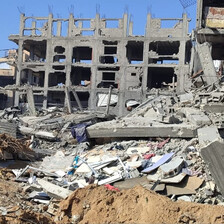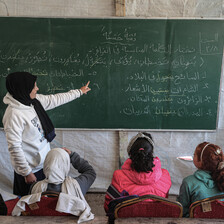The Electronic Intifada 26 August 2025

Mourners pay their final respects to Al Jazeera correspondent Anas al-Sharif on 11 August.
APA imagesOn 10 August, the Israeli military carried out a targeted strike — using a suicide drone — on journalists inside the Al Jazeera tent next to Al-Shifa Hospital in Gaza.
The attack came after the Israeli military made repeated threats against Al Jazeera correspondents Anas al-Sharif and Mohammad Qreiqeh, who were killed alongside two colleagues, Ibrahim Zaher and Mohammad Noufal, both camera operators.
Three other people who were present were also killed, freelance journalists Mohammad al-Khaldi, Mo’men Aliawa and Saad Jundiya, a civilian who happened to be present.
Saeed Hasballah, 27, a freelance cameraman with Al Jazeera, said he had been inside the Al Jazeera tent just twenty minutes before the strike, discussing the ongoing genocide.
“It was the first time Anas and Mohammad Qreiqeh were present together at the same time. They usually alternated shifts and shared work hours to ensure the truth reached the world,” Hasballah told The Electronic Intifada.
Wadi Abu al-Soud, 32, a reporter with Yemen TV, was in his own tent, just 30 meters away from the Al Jazeera tent, when it was bombed. All day, he said, Israeli warplanes had been flying extremely low and eastern Gaza had suffered relentless bombardment.
“The aircraft were so close that journalists began telling each other the night would be hard, and they started praying for one another,” al-Soud said.
Both al-Soud and Hasballah said they were startled by the deafening blast at around 11:30 pm.
“The strike directly hit Anas — he died instantly,” al-Soud said. “Mohammad Qreiqeh was critically wounded. I went to save him, but he passed away within moments.”
“This was a direct targeting of the journalists inside the Al Jazeera tent,” Hasballah said.
Silencing the truth
Both journalists said the attack was deliberate and intended to silence the truth coming out of Gaza – where journalists are documenting scenes of bombings, killings, wanton destruction, mass displacement and a systematic Israeli starvation policy engineering a famine against the people of Gaza.
They also said the assault on Al Jazeera was in preparation for the mass expulsion of Palestinians from Gaza City, as Israeli prime minister Benjamin Netanyahu and other senior government ministers have threatened repeatedly over the past nearly two years.
Anas’ will was written in early April this year, after repeated threats and harassment from the Israeli military.
In it, Anas starts by writing that if “these words of mine reach you, know that Israel has succeeded in killing me and silencing my voice.”
The correspondent expressed his confidence that Palestine would never surrender, and entrusted the care of his mother, his infant son Salah — born during the war — his daughter – the “apple of my eye,” Sham, 4, and his wife Bayan to those left behind.
To others he wrote: “I advise you not to be silenced by restrictions, nor to be paralyzed by borders. Be bridges toward the liberation of the country and its people, so that the sun of dignity and freedom may shine upon our usurped homeland.”
Hasballah was a close friend of Ismail al-Ghoul, an Al Jazeera journalists who was killed on 31 July 2024, while returning from filming a news report in Gaza’s Beach Camp.
Al-Ghoul had just completed reporting from the destroyed home of Hamas leader Ismail Haniyeh for Al Jazeera, and Hasballah said Ismail had often told him he was being threatened daily, just like Anas.
Both al-Soud and Hasballah said they were in shock after witnessing their friends die in front of them, powerless to save them.
“It was only three hours later, I realized I had shrapnel in my back,” al-Soud said. “Seeing Anas and Mohammad like that, my nerves collapsed – I didn’t even notice my own wounds.”
“Anas and Mohammad were not just colleagues – they were my brothers. My wife has been suffering from a serious illness with no medicine available in Gaza for a week, and both of them had been helping me search for medicine.”
Atrocious crimes
Hasballah spoke of his bond with Mohammad Qreiqeh. Since the second Israeli invasion of Al-Shifa Hospital, in April of last year, they endured siege together.
Al-Soud had stood by Mohammad and supported him when Mohammad’s mother was killed during the invasion of Al-Shifa. She had gone missing, and was found in the street where Mohammad had to eventually identify his mother’s corpse by the way she slept, her nails and her hair.
The Palestinian Journalists Syndicate denounced this latest Israeli atrocity against journalists in Gaza.
Ahed Farwana, head of the syndicate in Gaza, told The Electronic Intifada that the targeting of journalists is “an atrocious crime.”
“International law clearly requires the protection of journalists in times of conflict,” Farwana said, adding that the PJS had referred Israel – yet again – to the International Criminal Court, whose inaction is increasing the danger to journalists.
“The ICC’s failure to act on these cases gives the occupation a green light to commit more crimes against Palestinian journalists.”
Still there is no action from international bodies and still Israel kills journalists. On 25 August, an Israeli strike on another hospital, Nasser Medical Complex in Khan Younis, killed another five journalists among 20 fatalities.
Nonetheless, journalists in Gaza remain undeterred. Baidaa Moamer, a TV presenter with Palestine TV, told The Electronic Intifada:
“The language of humanity is our shared language and we have sworn to deliver the message – even if only one journalist remains alive.”
Ohood Nassar is a writer currently finishing her degree in education studies in Gaza.





